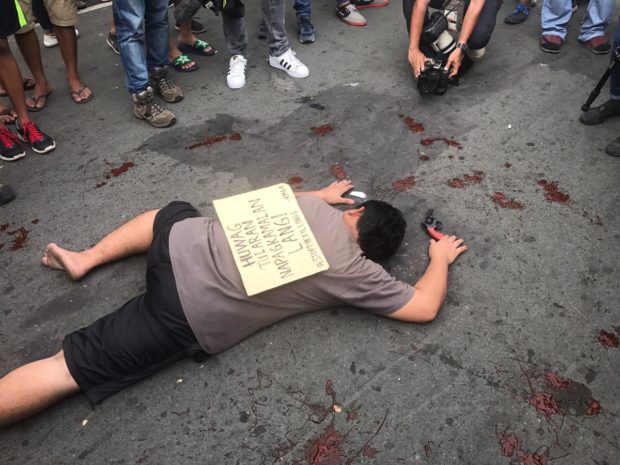2 out of 3 Filipinos say cops in drug slays shouldn’t get cash rewards

Reenactment of an alleged victim of President Duterte’s war of drugs. NESTOR CORRALES/INQUIRER.NET
Most Filipinos disagree that policemen should be given cash rewards for killing drug suspects in President Rodrigo Duterte’s war on drugs, according to the findings of the latest Social Weather Stations (SWS) survey.
Results of the 2017 Third Quarter Social Weather Stations Survey released on Tuesday showed that 65 percent of Filipinos disagreed with giving policemen cash rewards for kills, 15 percent agreed and 20 percent were undecided, for an “extremely weak” -50 net agreement (agree minus disagree) with the poll statement that it is right for officers to be given cash rewards for every drug suspect they kill.
The survey, taken from Sept. 23 to 27, polled 1,500 adults nationwide — 600 in Balance Luzon and 300 each in Metro Manila, the Visayas and Mindanao — and had a margin of error of plus or minus 3 percentage points.
The Philippine National Police has not acknowledged the existence of a reward program in the war on drugs, but Mr. Duterte, before taking office in June last year, promised bounties for the capture dead or alive of suspected drug lords.
Speaking to reporters in Davao City, Mr. Duterte said he would pay up to P3 million for every drug lord turned in.
Article continues after this advertisementHe said he would pay P2 million for drug distributors; P1 million for syndicate members who were “in the second echelon,” and P50,000 for “ordinary” drug peddlers.
Article continues after this advertisementMr. Duterte said he would get the money from his excess campaign funds.
Reuters special report
He has not mentioned the rewards since.
The British news agency, Reuters, published on April 18 a special report detailing how policemen received rewards for killing drug suspects and planting evidence at crime scenes in Mr. Duterte’s war on drugs.
The report, written by Manuel Mogato and Clare Baldwin, was based on interviews with a retired police intelligence officer and an active police commander, both of whom spoke on the condition of anonymity.
Citing an unpublished report prepared by the intelligence officer, Reuters said police were paid to kill not just drug suspects but also rapists, pickpockets, swindlers, gang members, alcoholics and other “troublemakers” for P10,000 each.
The report also stated that the cash “reward scales” for drug killings ranged from P20,000 for a “street level pusher and user” to P50,000 for a member of a neighborhood council, P1 million for “distributors, retailers and wholesalers,” and P5 million for “drug lords.”
Reuters said some of the accusations against individuals could not be confirmed so it was not publishing the full document.
But it said many of its findings supported previous investigations of the drug war by independent human rights monitors.
The police commander, meanwhile, told Reuters that “buy-busts” were actually well-planned executions and targets were chosen from lists of suspects drawn up by police and local officials, who later coordinated to unplug security cameras in the neighborhood where a killing was planned.
“We have to plant evidence for the legality of the operation,” the police commander said. “We are ordered to do these operations, so we have to protect ourselves.”